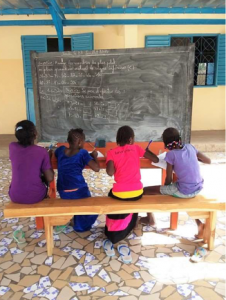Each year, the month of September is the occasion to highlight the issue of access to education for all. We interviewed Marine Fourié, Executive Director of Futur au Présent, on the challenges of girls' education in Sub-Saharan Africa.

Marine Fourié is the Executive Director of the association Futur au Présent, which created in 2014 the Maison de l’Éducation (House of Education) in Senegal in the Kandé district, where 4 schools are located.
Supplementary scheme for public schools, the House of Education welcomes and supports every year a new promotion of 90 girls from the poorest families in order to get them out of early work and enable their empowerment. This house offers psychosocial follow-up for young girls, school support modules, pedagogical follow-up and awareness-raising actions on gender equality, as well as mediation actions with their parents. This project is supported by the RAJA-Danièle Marcovici Foundation.
Based on our experience on the ground with very disadvantaged families, two main issues affect girls’ education today: access to and retention in school.
The first issue relates to the fact that in Senegal, public schools are not free, since parents are charged a registration fee. These are not large sums, about 3000 FCFA per child, which amounts to about 5 euros. But for poor families and with several children, these fees are often the reason for not attending school, especially for girls. In fact, when it is necessary to choose between two children who will be educated, the preference is systematically given to the boy.
The second issue is keeping girls in school and continuing their education. We note that in Senegal, there are as many girls as there are boys in elementary classes. However, this trend is reversed from high school onwards and is accentuated at university, where there are more boys than girls. One of the challenges is to ensure that girls do not drop out of school early. Too often their schooling is stopped to favour the building of family.
The first brake is quite technical: it concerns the issue of birth certificates. Although this subject is often unknown, it has a real impact on schooling. In various countries of West Africa, and especially in the poorest environments, many children do not have a birth certificate, that is, they were not declared at birth and therefore do not have any documents to prove their identity. In Senegal, children can go to school without these identity documents, but it is impossible for them to continue their studies beyond the fifth grade. The transition to college is conditional on obtaining a national examination at the end of CM2, an examination requiring the presentation of an identity document. Without a birth certificate, it is impossible to register for the test, and therefore impossible to enter college.
The second obstacle is more a matter of belief: we see that very often, the most disadvantaged families do not believe in school. For them, their children cannot succeed because they are themselves, in most cases, illiterate, and do not have the financial and intellectual means to supervise their children in their school work. So either parents give up their child from the start or they take them out of school if they see that it’s not working. This phenomenon of school dropout particularly affects girls, who combine schooling and domestic work: since they cannot devote themselves fully to school, they are falling behind, failing grades and are quickly removed from school.
Since 2014, Futur Au Présent has been developing a program called House of Education which aims to support girls from disadvantaged families and previously in early working situations in their schooling and empowerment. The goal is to give them the means to succeed in school, and thus counter the beliefs mentioned above.
 We note that most of the supported girls, who have joined the programme as illeterate, are at the head of the public school after one year. Their parents see that it is possible for them to succeed: they are the pride of their family, who no longer consider taking them out of school and want them to continue their scholarship by entering university. Through this program, Futur Au Présent also carries out awareness-raising activities so that families understand that their daughters can access higher education, have responsible jobs, and thus build a family out of great poverty.
We note that most of the supported girls, who have joined the programme as illeterate, are at the head of the public school after one year. Their parents see that it is possible for them to succeed: they are the pride of their family, who no longer consider taking them out of school and want them to continue their scholarship by entering university. Through this program, Futur Au Présent also carries out awareness-raising activities so that families understand that their daughters can access higher education, have responsible jobs, and thus build a family out of great poverty.
To ensure the effective schooling of these girls from very poor families, it is also fundamental to provide support to families, so that money is not a brake. Futur Au Présent therefore covers the costs of registration as well as school materials. Similarly, since the lack of civil status documents is a real barrier from elementary school onwards, we are raising awareness and information on these issues.
In short, in order to take action on girls’ education, we think it is important to put in place a comprehensive approach that puts girls’ success at the centre and that removes all barriers to success, embarking families into this dynamic.
>> To read our full article on girls’ education, click here